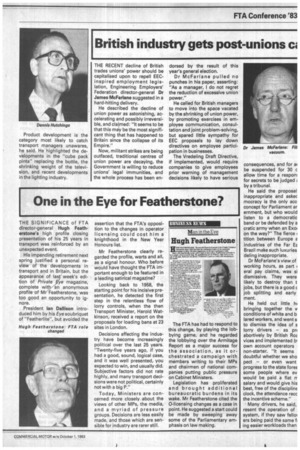British industry gets post-unions a
Page 61

If you've noticed an error in this article please click here to report it so we can fix it.
Product development is the category most likely to catch transport managers unawares, he said. He highlighted the developments in the "cube pack pinta" replacing the bottle, the shrinking weight of the television, and recent developments in the lighting industry. THE RECENT decline of British trades unions' power should be capitalised upon to repel! EECinspired employment legislation, Engineering Employers' Federation director-general Dr James McFarlane suggested in a hard-hitting delivery.
He described the decline of union power as astonishing, accelerating and possibly irreversible, and claimed: "It seems to be that this may be the most significant thing that has happened to Britain since the collapse of its Empire."
Now, militant strikes are being outfaced, traditional centres of union power are decaying, the Government is willing to reduce unions' legal immunities, and the whole process has been en dorsed by the result of this year's general election.
Dr McFarlane pulled no punches in his paper, asserting: "As a manager, I do not regret the reduction of excessive union power."
He called for British managers to move into the space vacated by the shrinking of union power, by promoting exercises in employee communication, consultation and joint problem-solving, but spared little sympathy for EEC proposals to lay down directives on employee participation in businesses.
The Vredeling Draft Directive, if implemented, would require companies to give employees prior warning of management decisions likely to have serious




































































































